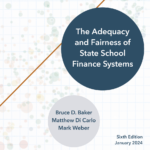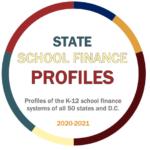Visualization: Equal opportunity (adequacy by district poverty)
Select a state and year (2009-2021) from the menu below. For each district poverty level, the graph will display two bars:
- Required (or adequate) spending per pupil (blue bars): cost model estimates of how much the state would have to spend for its students to achieve national average test scores, by district poverty quintile;
- Actual spending per pupil (teal bars): how much that state actually spends, by district poverty quintile.
The table to the right of the graph expresses the bar graph in terms of percentages—i.e., the percentage difference between actual and adequate spending by district poverty quintile (we call each of these five percentages “adequacy gaps”). The difference (in percentage points) between the adequacy gap in the highest- and lowest poverty quintiles is one way to express each state’s “equal opportunity gap” in a given year (in our annual report, we compare the two highest- with the two lowest-poverty quintiles, but states’ relative results are very similar using either approach).
The best way to interpret these opportunity gaps is to compare them with those in other states (or groups of states) in the same year (e.g., using the “EO gap rank” in the bottom right corner), or in the same state over time.
The five district poverty groups are measured with U.S. Census poverty data, and are defined as state-by-state quintiles (this means, for example, that the highest-poverty districts in one state may have higher or lower average poverty rates than the highest-poverty districts in a different state). Adequacy estimates are not available for Hawaii (as the state consists of a single government-run district), or for Vermont between 2017-2021 (due to data irregularities). For more information on these measures, see our State Indicators Database user’s guide and our annual report. You can also download the full dataset.
Note: if you get an “unexpected error” message when attempting to load the Tableau visualization, try enabling third party cookies in your web browser.
Visualization by Bilan Jama, Emilee O’Brien, and Lauren Schneider
Latest News
 NEW DISTRICT COST DATABASE ESTIMATES AVAILABLE
NEW DISTRICT COST DATABASE ESTIMATES AVAILABLE
April 2024: Download the full dataset with adequacy estimates for over 12,000 school districts from 2009 to 2021, or look up individual districts’ results with our online visualization tool.
Latest Annual Report
 The Adequacy and Fairness of State School Finance Systems (sixth edition)
The Adequacy and Fairness of State School Finance Systems (sixth edition)
The sixth edition of our annual report presenting findings on effort, statewide adequacy, and equal opportunity in state school finance systems. Published January 2024.
Latest Research Briefs
 State School Finance System Profiles (2020-21 school year)
State School Finance System Profiles (2020-21 school year)
One-page profiles summarizing the key results on effort, statewide adequacy, and equal opportunity for all 50 states and D.C. View your state’s profile. Published January 2024.




